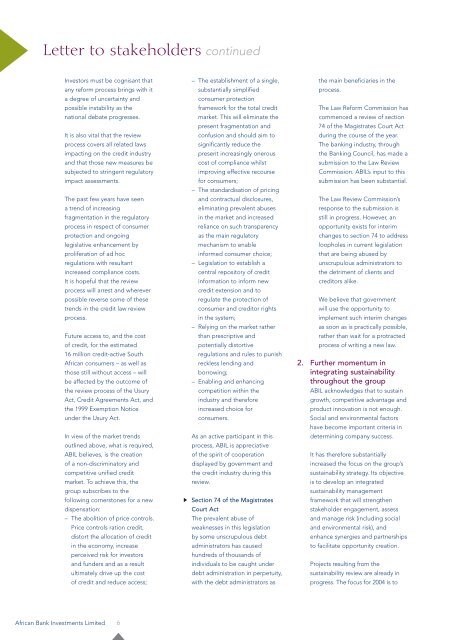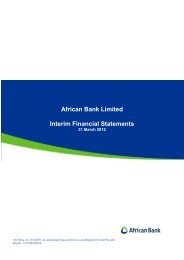Download - African Bank
Download - African Bank
Download - African Bank
Create successful ePaper yourself
Turn your PDF publications into a flip-book with our unique Google optimized e-Paper software.
Letter to stakeholders continued<br />
Investors must be cognisant that<br />
any reform process brings with it<br />
a degree of uncertainty and<br />
possible instability as the<br />
national debate progresses.<br />
It is also vital that the review<br />
process covers all related laws<br />
impacting on the credit industry<br />
and that those new measures be<br />
subjected to stringent regulatory<br />
impact assessments.<br />
The past few years have seen<br />
a trend of increasing<br />
fragmentation in the regulatory<br />
process in respect of consumer<br />
protection and ongoing<br />
legislative enhancement by<br />
proliferation of ad hoc<br />
regulations with resultant<br />
increased compliance costs.<br />
It is hopeful that the review<br />
process will arrest and wherever<br />
possible reverse some of these<br />
trends in the credit law review<br />
process.<br />
Future access to, and the cost<br />
of credit, for the estimated<br />
16 million credit-active South<br />
<strong>African</strong> consumers – as well as<br />
those still without access – will<br />
be affected by the outcome of<br />
the review process of the Usury<br />
Act, Credit Agreements Act, and<br />
the 1999 Exemption Notice<br />
under the Usury Act.<br />
In view of the market trends<br />
outlined above, what is required,<br />
ABIL believes, is the creation<br />
of a non-discriminatory and<br />
competitive unified credit<br />
market. To achieve this, the<br />
group subscribes to the<br />
following cornerstones for a new<br />
dispensation:<br />
– The abolition of price controls.<br />
Price controls ration credit,<br />
distort the allocation of credit<br />
in the economy, increase<br />
perceived risk for investors<br />
and funders and as a result<br />
ultimately drive up the cost<br />
of credit and reduce access;<br />
<strong>African</strong> <strong>Bank</strong> Investments Limited 6<br />
– The establishment of a single,<br />
substantially simplified<br />
consumer protection<br />
framework for the total credit<br />
market. This will eliminate the<br />
present fragmentation and<br />
confusion and should aim to<br />
significantly reduce the<br />
present increasingly onerous<br />
cost of compliance whilst<br />
improving effective recourse<br />
for consumers;<br />
– The standardisation of pricing<br />
and contractual disclosures,<br />
eliminating prevalent abuses<br />
in the market and increased<br />
reliance on such transparency<br />
as the main regulatory<br />
mechanism to enable<br />
informed consumer choice;<br />
– Legislation to establish a<br />
central repository of credit<br />
information to inform new<br />
credit extension and to<br />
regulate the protection of<br />
consumer and creditor rights<br />
in the system;<br />
– Relying on the market rather<br />
than prescriptive and<br />
potentially distortive<br />
regulations and rules to punish<br />
reckless lending and<br />
borrowing;<br />
– Enabling and enhancing<br />
competition within the<br />
industry and therefore<br />
increased choice for<br />
consumers.<br />
As an active participant in this<br />
process, ABIL is appreciative<br />
of the spirit of cooperation<br />
displayed by government and<br />
the credit industry during this<br />
review.<br />
Section 74 of the Magistrates<br />
Court Act<br />
The prevalent abuse of<br />
weaknesses in this legislation<br />
by some unscrupulous debt<br />
administrators has caused<br />
hundreds of thousands of<br />
individuals to be caught under<br />
debt administration in perpetuity,<br />
with the debt administrators as<br />
the main beneficiaries in the<br />
process.<br />
The Law Reform Commission has<br />
commenced a review of section<br />
74 of the Magistrates Court Act<br />
during the course of the year.<br />
The banking industry, through<br />
the <strong>Bank</strong>ing Council, has made a<br />
submission to the Law Review<br />
Commission. ABIL’s input to this<br />
submission has been substantial.<br />
The Law Review Commission’s<br />
response to the submission is<br />
still in progress. However, an<br />
opportunity exists for interim<br />
changes to section 74 to address<br />
loopholes in current legislation<br />
that are being abused by<br />
unscrupulous administrators to<br />
the detriment of clients and<br />
creditors alike.<br />
We believe that government<br />
will use the opportunity to<br />
implement such interim changes<br />
as soon as is practically possible,<br />
rather than wait for a protracted<br />
process of writing a new law.<br />
2. Further momentum in<br />
integrating sustainability<br />
throughout the group<br />
ABIL acknowledges that to sustain<br />
growth, competitive advantage and<br />
product innovation is not enough.<br />
Social and environmental factors<br />
have become important criteria in<br />
determining company success.<br />
It has therefore substantially<br />
increased the focus on the group’s<br />
sustainability strategy. Its objective<br />
is to develop an integrated<br />
sustainability management<br />
framework that will strengthen<br />
stakeholder engagement, assess<br />
and manage risk (including social<br />
and environmental risk), and<br />
enhance synergies and partnerships<br />
to facilitate opportunity creation.<br />
Projects resulting from the<br />
sustainability review are already in<br />
progress. The focus for 2004 is to







